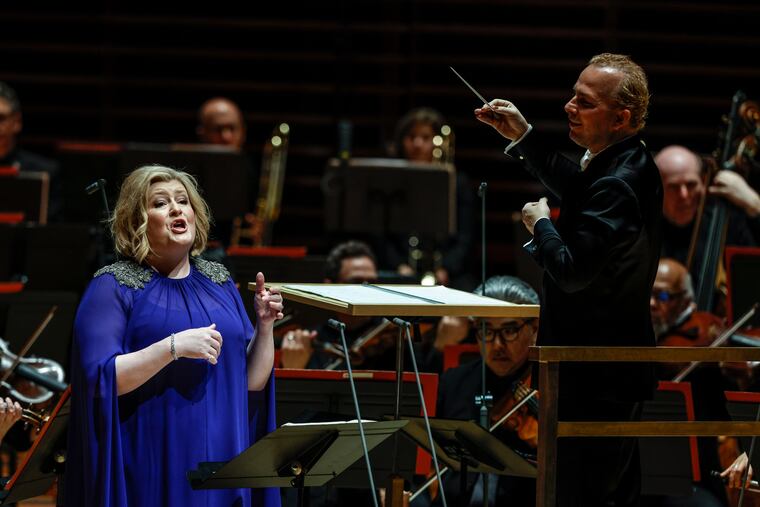Mahler thought music might distract his wife from her obligations. On Thursday, her compositions shone at the Philadelphia Orchestra.
The orchestra plays works by Alma and Gustav Mahler - including his gargantuan Symphony No. 7.

“A husband and wife who are both composers: how do you envisage that?”
After all, Gustav asked, what if Alma were attending to her household duties or his needs, and musical inspiration suddenly struck?
Inspiration wasn’t theoretical at that point, as the Philadelphia Orchestra beautifully illustrated Thursday night. By the time Gustav Mahler wrote discouragingly to his bride to be, in late 1901, Alma Schindler had already composed the four gorgeous songs the Philadelphians performed this week with mezzo-soprano Karen Cargill and conductor Yannick Nézet-Séguin. She was a little more than 20 at the time.
Husband eventually grew to be supportive of wife’s compositional life. But as the orchestra was playing in Verizon Hall — its first experience with any of her works — you couldn’t help but wonder: How would this musical talent have developed had his initial reaction (recorded in a collection of letters from Gustav to Alma) been different?
The program itself had the unfortunate effect of echoing Mahler’s bigfooting of Schindler-Mahler. The nuanced songs made up a short first half of the concert, followed after intermission by a great big event of a piece, Gustav’s Symphony No. 7. But what’s more important is that the four songs got an outing, and, completely divorced from any kind of anti-chauvinistic considerations, deservedly so.
Performed here in lush, vibrant 1995 orchestrations by Colin and David Matthews, these are works of a sophisticated and individualistic composer. The style is late-Romantic, but of a distinct subvariety.
The transition from a fading day to emergent mists is perfectly captured in the gathering harmonic tensions — and surprising resolution — of “The Silent Town,” and especially so with the Matthews brothers’ added Straussian palette.
The text of “In My Father’s Garden” could have suggested a number of different emotional directions, but Schindler-Mahler chose bliss — a floating quality heightened by the thrill of Cargill’s smooth-as-silk vocal work.
The mezzo used vibrato judiciously to shape the story of two lovers finding each other in “Warm Summer Night.” Remarkably, there’s an intimate informality to the brief song that seems to anticipate cabaret.
Oboist Peter Smith signaled the pastoral undertones of “With You I Feel at Ease,” and somehow it was the serene, strolling feeling of this song I found most affecting of the set.
Gustav Mahler’s Symphony No. 7 is jarring under any circumstances, and even cushioned by intermission it seemed especially so in comparison to the set of Schindler-Mahler songs. But in many ways, the performance was a triumph. Sonically, for sure. Nézet-Séguin and the orchestra managed to find dozens of varieties of ensemble sounds — gaudy, heavenly and frightening in places — without ever growing harsh. With instrumental sections packed (five flutists! a wall of percussion!) plus added exotics like mandolin and guitar, Mahler moved far beyond the normal Romantic-era orchestra with the work.
All was in the service of creating a sound world somewhere beyond. With enormous polish and resonance, Matthew Vaughn showed why it was the euphonium (the score calls for a tenor horn) that could best sail such a strange and powerful sound over the rest of the ensemble in the first movement. Bassoons were wonderfully barky, clarinets wild, horns gliding majestically in the second movement “Nachtmusik.” Virtuoso windy gusts moved through the strings in the third movement. So disparately colored were the effects that the ringing out of a cell phone from the audience seemed like a plausible addition (almost).
Nézet-Séguin pushed tempos a bit far in places, but he highlighted an underlying truth: in Mahler, you’re never really safe. Warmth and sweetness are abundant, but often they’re followed by a contradictory jab. Nothing, however, could have detracted from the adrenaline of the last movement. This is grandly manic music, unmistakably celebratory with an emotional command at the end for the audience to explode. This one seemed only too happy to oblige.
Additional performances: Saturday at 8 p.m. and Sunday at 2 p.m. in Verizon Hall, Broad and Spruce Sts. Tickets are $52-$181. philorch.org, 215-893-1999.